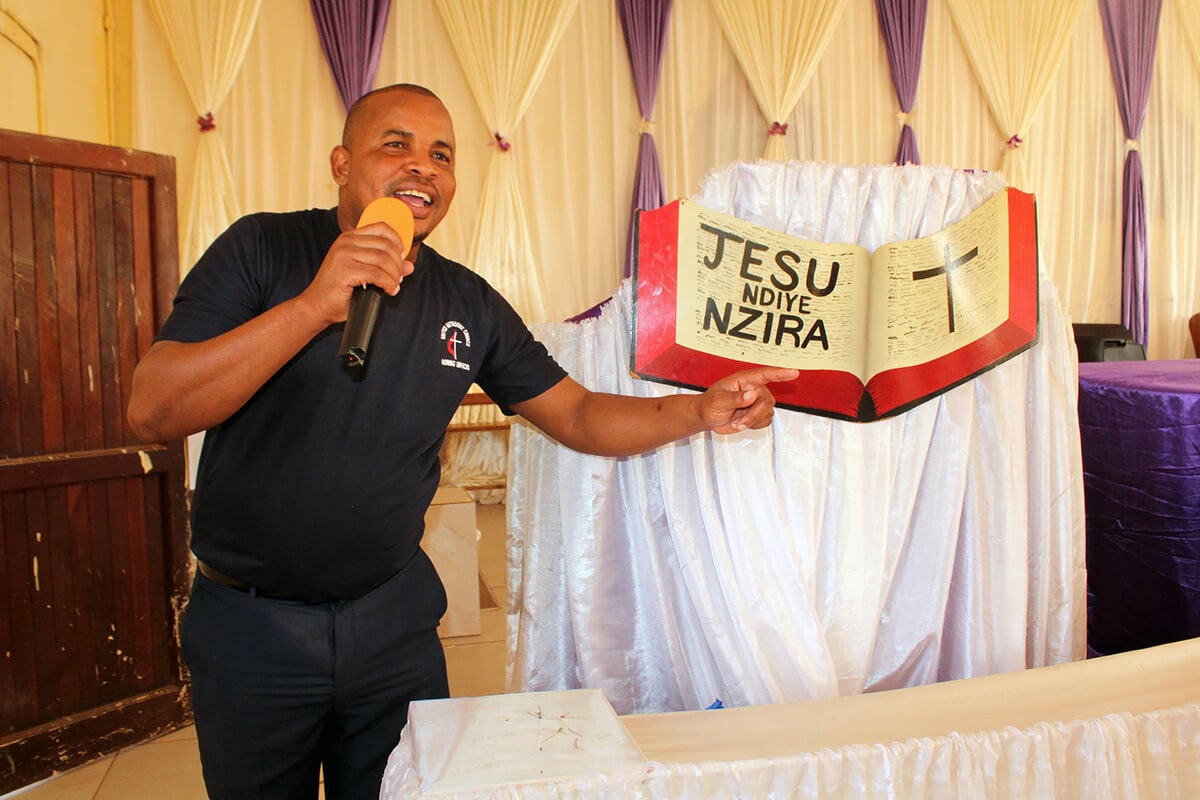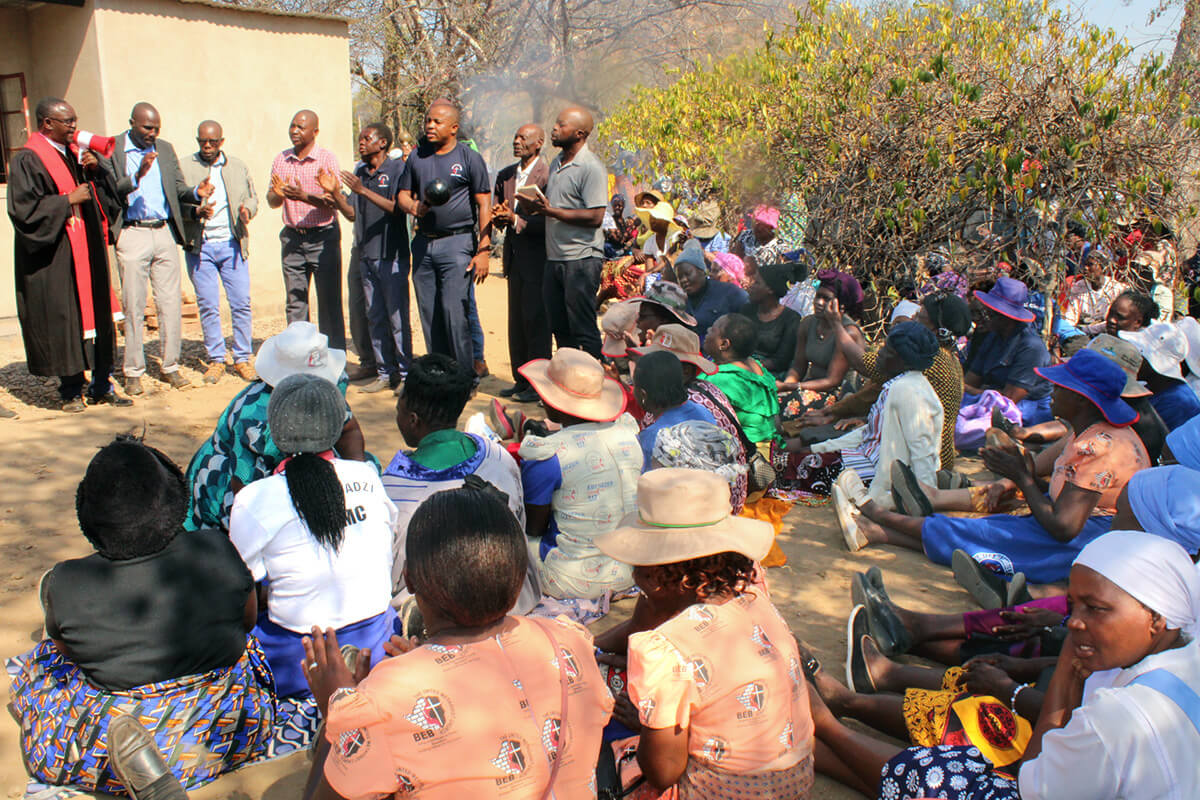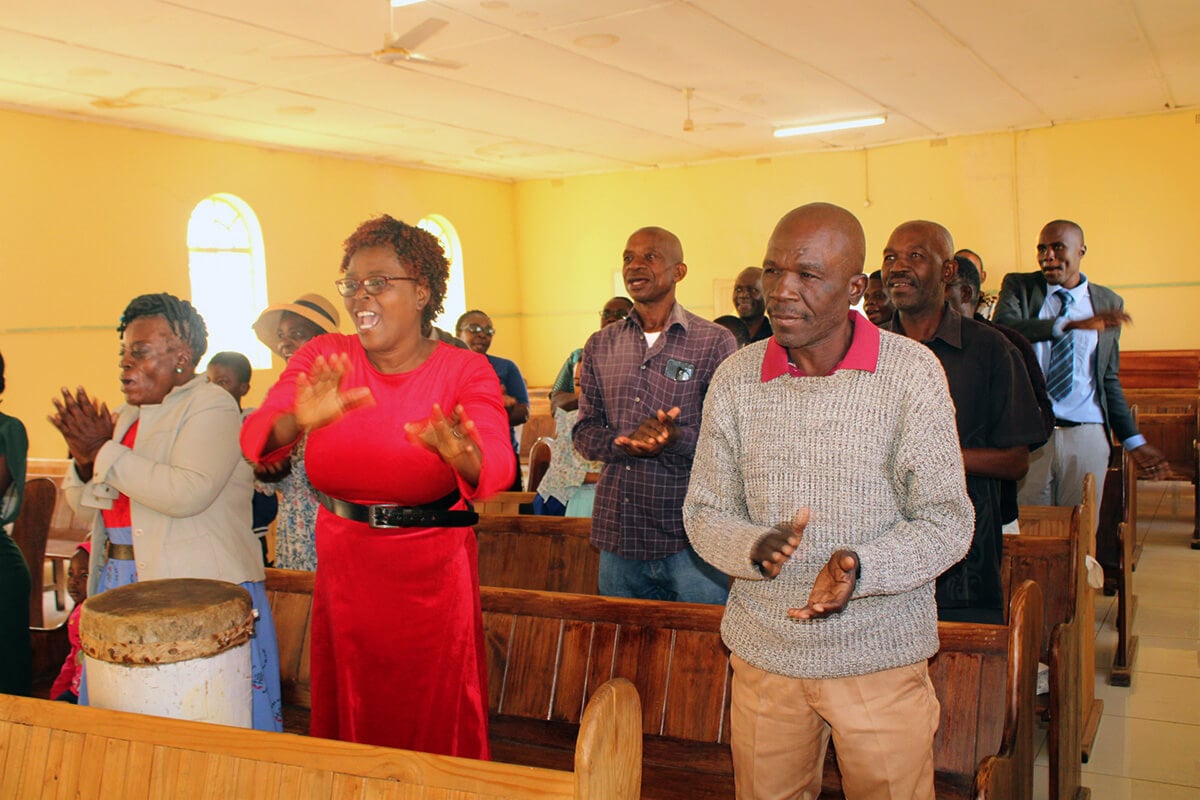Key points:
- The 7 a.m. church service in Nyanyadzi began with three people and has grown to more than 40 since its start three years ago.
- The service has drawn people who have struggled with addiction and other problems, with a setting that emphasizes connection and growth rather than judgment.
- Bishop Gift K. Machinga described the ministry as “a powerful and Christ-centered form of evangelism that demonstrates the true mission of the church, restoring lives and offering hope.”
Nestled in the heart of Nyanyadzi, a farming community once troubled by addiction, violence and social disintegration, a quiet revolution is unfolding.
It begins not with loud declarations or public marches, but in the soft glow of early morning prayer, where hope finds its footing long before the sun rises.
Local residents call it simply “Morning Service.”
It started with a whisper. Just three people: the Rev. Godfrey Gaga, a newly appointed United Methodist pastor; Tirivanhu Chimhutu, now church evangelist; and Harry Ndoro, a man once deep in the grip of alcohol addiction.
During a funeral in 2022, Ndoro, under the influence of alcohol, stood and began singing Hymn 46: “Mwari Mubatsiri Wangu” (“God Is My Helper”). His voice, unsteady but sincere, moved something in the hearts of mourners. Gaga saw not a disturbance, but a soul crying out. That moment became the seed of transformation.
“I reached out to Harry and invited him to a church service,” said Gaga, Nyanyadzi Circuit pastor-in-charge. “Feeling unsure, Harry requested a more private space. The 7 a.m. service was born in 2022, with just three in attendance.”

From those humble beginnings, the group grew to more than 40. Others followed, including Danny Dube, once known for criminal behavior, and Chlorine Mukotamo, who struggled with drug addiction. Their families also joined.
To make the church a familiar and welcoming space, Gaga introduced elements that the new members associated with social life. Doing so, he said, created an environment that celebrated connection and growth rather than judgment.
“Peace and joy now echo through a once-troubled Nyanyadzi, and what began as a quiet gathering of three has become a wave of healing across the community,” Gaga said.
Bishop Gift K. Machinga serves the Zimbabwe, Zambia, Botswana and Malawi Episcopal Area. “Nyanyadzi Circuit’s outreach program to men, women and youth struggling with alcohol addiction,” he commented, “is a powerful and Christ-centered form of evangelism that demonstrates the true mission of the church, restoring lives and offering hope.
“By creating a dedicated 7 a.m. service attended by over 30 people, the circuit is meeting people where they are, offering a safe space for transformation and showing that the church is a place of healing rather than judgment,” he said. “This approach reflects compassion, understanding and a commitment to walking with people through their journey of recovery and faith.
“To sustain and grow this work,” said Machinga, “Nyanyadzi is encouraged to remain consistent, involve the wider church community to reduce stigma and consider partnering with professionals for holistic care.”

He encouraged other circuits to emulate this example, not by ignoring the hard-to-reach or marginalized but, instead, stepping out in boldness and compassion to bring Christ to those who feel forgotten. Evangelism is both about increasing attendance and transforming lives.
“Nyanyadzi’s ministry,” Machinga said, “is a shining example of that calling in action.”
The service offers no quick fixes, only consistency, compassion and presence.
“I call it church for slow learners,” said Dube, once feared for his violent tendencies. “I am one of them, and I am OK with that.
“Change is slow,” he admitted. “After church, I still end up at the bottle store. But at least I hear the Word. Maybe one day, it will stick.”
Gaga said Dube was known in Nyanyadzi for causing disturbances.
“He disrupted funerals, picked fights in the streets, and was in and out of prison for different cases. But Morning Service met him where he was. At one recent funeral, Danny sat quietly in the back. No fights, no shouting. Just stillness.”

The transformation did not end with Dube.
Felix Chimutopo confessed that his drinking had almost destroyed his family. “When I was under the influence of alcohol, I would get angry over small things. I caused pain. But now I am in harmony with my family. My daughter is getting married, and we are all going to church together to pray for the event to be a success,” he said with a smile.
His wife, Josephine, agreed. “Now he loves the family and even joins our prayers,” she said. “He is a giver and helps people at work, too.”
Chlorine Mukotamo shared how his mother’s death derailed him into substance abuse from a young age. “I used to take anything — drugs, alcohol — I did not care,” he said. “But now, my health is better. I have found love in the church. I am even good at singing at funerals, revivals and church. I now know where to use my talent productively.”
Mauya Chipiro had abandoned his farming and turned to alcohol. “I stopped farming, stopped supporting my family,” he said. “I have begun to pray for forgiveness. I am working hard to make up for lost time.”
For Isay Rwizi, a teacher and associate lay leader, Morning Service did not just save his faith; it also saved his profession.
Subscribe to our
e-newsletter
“I used to be a respected educator,” he said, “but had fallen into heavy drinking after becoming disillusioned with the church. This affected my performance at work. I was lost.”
Morning Service helped him reclaim his faith and his life, and Rwizi eventually was promoted to senior teacher.
“Drug and substance abuse among schoolchildren is a growing concern in Zimbabwe leading to poor academic performance, mental health problems, risky behaviors and broken families,” said Dr. Chenai Mareya, a member of Chisipiti United Methodist Church.
“According to the Zimbabwe Republic Police Drug and Narcotics department, over 10,000 drug-related arrests were made in 2023, with many involving youth. The church and community have a vital role in prevention, support and rehabilitation.”
Sydney Mushayabasa, Nyanyadzi Circuit lay leader, is also a sergeant with the Zimbabwe Republic Police. “Our main objective is to maintain peace in the society. There is a massive problem of drugs in this area — crystal meth, Broncleer (cough syrup), glue and even prescription meds. People, especially youth, are wasting away,” he said.
“But since Morning Service began, I have seen a drop in violence, an improvement in hygiene and reunification of broken families. It is like a rehabilitation center. And it is working.”
Ward 8 council member Gift Mtetwa applauded Gaga for reaching out to “people society had written off.”
Tawanda Nkomo, who struggled with alcoholism, said the changes are obvious.
“We are now sober. Families are whole. The violent are calm. Children see their parents differently. Spouses are reconciling. People once mocked now stand to preach and pray.”
Now wearing uniforms, the group eats, sings and serves together.
“Nothing is impossible with God,” Gaga said. “As the sun rises each morning over Nyanyadzi, so does a new hope. It comes quietly. Not with fanfare, but with faith. Not through perfection, but through persistence.
“This is Morning Service. And this is the light that is transforming a community, one soul at a time.”
Chingwe is a communicator for the Zimbabwe East Conference.
News media contact: Julie Dwyer at [email protected]. To read more United Methodist news, subscribe to the free UM News Digest.




